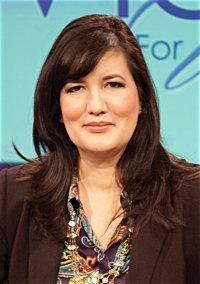
From disadvantaged immigrants to millennials, Latinos are in the abortion industry’s crosshairs. And while the largest U.S. minority group’s involvement in the pro-life movement is critical, many lack information to counter pro-abortion arguments, said Astrid Bennett Gutierrez, executive director of the Los Angeles-based VIDA Initiative, which trains leaders to work in local communities to end abortion.
“As goes the Latino community, so goes the pro-life movement,” said Gutierrez, 43, speaking at Human Life Alliance’s Oct. 18 gala in Maplewood. “[With] the goals that we have as a pro-life movement, if we don’t reach Latinos, I don’t see how we can reach [the goals].
It’s imperative that the Latino community be a part of who we’re reaching, and I would say it’s top priority.”
Non-negotiables
According to Census data, Latinos make up 17 percent of the U.S. population. Gutierrez said although they are instinctively pro-life, they hear from social workers and doctors in poor neighborhoods or from Planned Parenthood that abortion is acceptable or even the only way out of difficult situations.
As the 2016 election approaches, Latinos are not hearing a lot about the issue of abortion — one of the Catholic Church’s “non-negotiable” issues — either through Spanish-language media that focuses on issues such as immigration or even in some parishes, said Gutierrez, who was previously a co-host on Eternal Word Television Network’s “The Catholic View for Women.” (Four other non-negotiable issues outlined by the U.S. Catholic bishops are euthanasia, embryonic stem cell research, cloning and same-sex marriage.)
Gutierrez shared about the East Los Angeles neighborhood where she lived as a child. It is home to many poor and immigrant Latinos — and where nine abortion centers operate within a one-mile radius. Staff and volunteers at the pro-life clinic serving the neighborhood have helped save 6,000 babies in the past 16 years, she said.
Contraception and information about reproductive services are available to poor and immigrant Latinos in California often at the same location as government services, and social workers and doctors frequently pressure them to abort, she said. Pro-abortion policies like those in California may later be implemented in other states, she said.
“A lot of Hispanic women are lied to,” she said in a separate interview. “They’re being pressured into abortion because they’re being told they’re too poor, they’re too young, they’re alone, they’re immigrant, a number of myths and lies,” Gutierrez said. “They’re making a lot of money off our women and the vulnerability of our community.”
Catered messages
Educating with truth, love and effective pro-life materials helps Latinos realize what abortion is.
The VIDA Initiative, founded this year, prepares leaders and those they serve to provide education along with Blaine-based HLA, which produces Spanish-language and bilingual publications. Gutierrez and the VIDA Initiative have collaborated with HLA to produce a bilingual publication covering abortion-related issues and alternatives for Latinas.
Planned Parenthood gives Latino high school students English-language materials on abortion and contraceptives, although their families communicate in Spanish, said Joe Langfeld, 49, interim executive director of HLA, which creates and distributes a range of print and digital materials designed to educate readers and support values of chastity and human life from conception to natural death.
“Planned Parenthood in the Hispanic community goes right at the public schools, and they give them English-only information so that either parents or grandparents can’t read it,” he said. “They try to segregate them intentionally that way. A lot of these decisions get made amongst the whole family, so we want to make sure every generation can read.”
Latinos younger than 30 are shaping the culture, and pro-lifers can reach them with English-language messages that speak to their heritage and love of family, Gutierrez said.
Latinos see morality instinctively and don’t always understand the way life issues are presented in the United States, said Gutierrez, adding that there are no euphemisms such as “pro-choice” in Spanish.
”We are trying to explain to them there are fundamental issues like right to life, and marriage and religious liberty that have to be respected first and foremost that are non-negotiables, but this is news to a lot of them,” she said.
In the election messages there has been “deafening silence” about life issues while the focus has been on issues like immigration, she said.
“There is nothing more antithetical to Latino values than abortion because we love family,” Gutierrez said. “We protect our children. Immigrants are here for a better future for their children, and to destroy that child is absolutely the worst thing that can happen to us.”
Prayer and action
Gutierrez also spoke to Latino parishioners at St. Alphonsus in Brooklyn Center Oct. 16 about the pro-life movement in the Latino community, and about praying and working to end abortion.
Reyes Colin, 40, said he has recognized through videos and other information that abortion is bad physically and spiritually. He admitted that many Latinos know little about it.
Kelly Flores, 15, said she doesn’t think a lot about the issue of abortion, although it was discussed in her 10th grade health class.
“It’s not a good thing. The innocent life isn’t the reason for [people’s] mistakes,” she said.
Ricardo Gonzalez, 32, attended the talk because he was curious about the issue and wanted to learn how to approach it. He agreed that Latinos aren’t well informed about abortion.
“Doctors don’t give them enough information,” he said. “The media doesn’t help.”
When more Latinos become informed about the nightmare of abortion in this country, they will be influential in ending it, Gutierrez said.
“The heritage is so beautiful, and we have the power to change this country, because in fact we do, for good or for bad,” she said. “It’s a mistake to ignore this community.”



